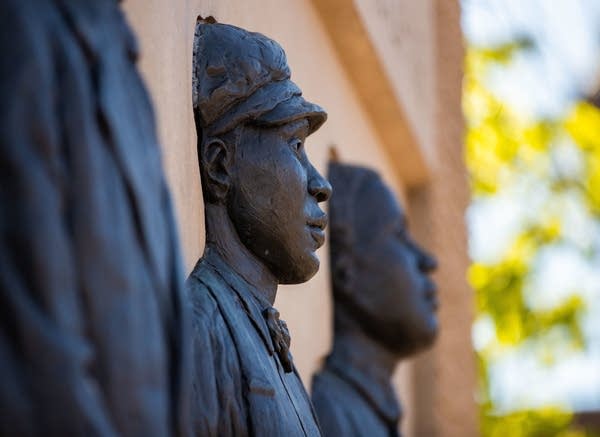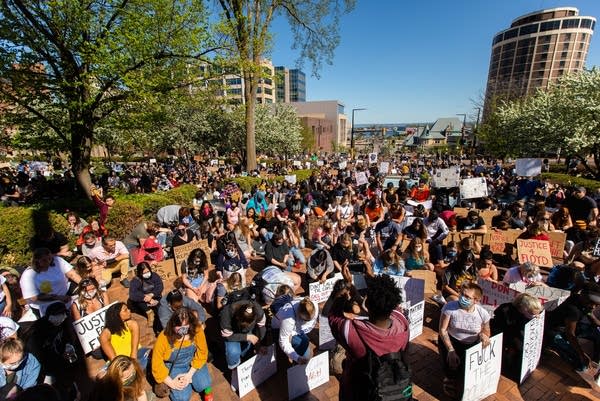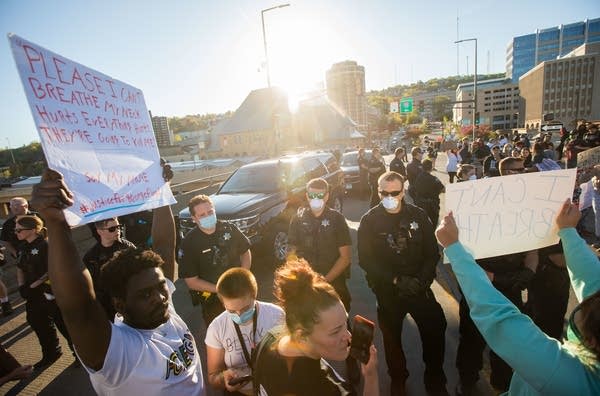‘We never solved the problem’: Echoes of 1920 Duluth lynching persist at centennial

Go Deeper.
Create an account or log in to save stories.
Like this?
Thanks for liking this story! We have added it to a list of your favorite stories.
On the corner of First Street and Second Avenue East in downtown Duluth, a simple, concrete monument marks the spot where a white mob lynched Elias Clayton, Elmer Jackson and Isaac McGhie from a light post on June 15, 1920.
Ten thousand people surrounded the men as they were killed.
Then the crowd parted so a picture could be taken: Dozens of white faces staring into the camera, some grinning, Jackson and McGhie's bodies still hanging from the street light, for a postcard later sold as a souvenir.
"We use the term ‘ritualized white supremacy,’” said Heidi Baak Hansen, one of the founding members of the committee that built the memorial, “and that's that's what we're talking about, where the photo is a trophy shot. It's a hunting photo."
Turn Up Your Support
MPR News helps you turn down the noise and build shared understanding. Turn up your support for this public resource and keep trusted journalism accessible to all.

The time and care it took to make that photo happen, Baak Hansen said, makes the scene all the more horrific.
To mark the 100 years that have passed since then, organizers planned to bring another 10,000 people to that same spot, to honor Clayton, Jackson and McGhie — to say their names and ensure their story is not forgotten.
A few months ago, the coronavirus disrupted that plan.
But then, a Minneapolis police officer killed George Floyd. And it was captured not by a postcard this time, but by cellphone video.
The pandemic had threatened to keep people out of the streets, but a tragedy brought them back.
The Saturday after Floyd was killed, more than 1,000 people gathered at the site of the memorial in Duluth, to honor another black man killed in the open, on a Minnesota city street.
Black and white, young and old, they marched to city hall, where the crowd spilled into the surrounding streets, saying his name.
George Floyd. And then: Philando Castile. Alton Sterling. And so many others.

Jordon Moses spoke at the rally. He helped to organize the 2020 commemoration of the Duluth lynchings.
For years, Moses said, people in Duluth have questioned the need for a memorial to mark the city's darkest hour, something that happened so long ago.
"They ask, ‘Why do we still gotta talk about this, why does this still matter?’” he said. But he had a ready answer. Because we didn’t fix it.
“There’s something in the roots of our community that needs to be dug out,” he said, “so that this can never happen again. and so that’s the reality, we’re talking about it because we never fixed the problem. We never solved the problem."
‘100 years overdue’
On June 14, 1920, 19-year old Irene Tusken and her boyfriend attended the traveling circus that had stopped in Duluth. While leaving the grounds after dark, Tusken alleged they were confronted by six black circus workers, armed with a gun, who raped her.
The next day, the police arrested several men. But neither Tusken nor her companion could identify any of them. Later, a physician who examined Tusken found no evidence of sexual assault. Nevertheless, 13 of the men were taken to the Duluth jail as likely suspects.
That evening, hundreds of white men surrounded the Duluth police station, demanding that officers turn over the prisoners. The city’s public safety commissioner ordered the 12 officers inside the jail to holster their guns; he didn’t want any blood of the white men spilled.

After several hours the crowd made its way into the jail. They wanted six men, but were only able to break into three cells.
Isaac McGhie was the first to be pulled out, dragged up the hill, and hanged from a streetlight, beaten and bloodied. Elmer Jackson and Elias Clayton were next.
In the months that followed, juries in Duluth convicted three of the white men involved in the lynching on rioting charges. The longest sentence served was two years. No one was convicted of murder.
But one black man who worked for the circus — Max Mason — was convicted of raping Tusken, despite no firm evidence linking him to the alleged crime.
Mason always maintained his innocence, and twice applied to have his sentence pardoned. The St. Louis County attorney admitted that Mason would likely not have been convicted “if he had been a white man,” but his requests for pardon were denied.
Eventually he was released after serving nearly five years, on the condition he leave Minnesota for his home in Alabama and not return to Minnesota for at least 16 years.

Max Mason’s name was largely forgotten, until last Friday, when the Minnesota Board of Pardons voted to clear Mason, nearly 100 years to the day that Clayton, Jackson and McGhie were lynched in Duluth.
It was the first-ever posthumous pardon granted by the state of Minnesota, a decision Gov. Tim Walz called “100 years overdue.”
‘We never forgot’
After the initial trials in the 1920s, the lynchings largely faded from public memory — except in Duluth’s black community, where over the years residents would quietly share the history with people who had newly arrived in town.
Carl Crawford still remembers the first time someone told him the story. It was in the 1980s, and he had moved to the region from Los Angeles to attend the University of Wisconsin-Superior, across the water from Duluth.

Crawford, now the city of Duluth’s human right officer, eventually became one of the founding members of the committee that built the memorial to Clayton, Jackson and McGhie in 2003.
Standing at the memorial recently, he read the inscription that lines the top of the memorial walls: "An event has happened upon which it is difficult to speak and impossible to remain silent."
That’s key, Crawford said. “We could not move forward as a community until we dealt with our past. We need to stop telling the lies that lynchings didn't happen on this side of the Mason-Dixon. That's why we've got to tell the story,” he said.
One hundred years later, Crawford said, black and brown people in Duluth continue to struggle, with gaping disparities in employment, housing, health care, and educational achievement.

On the centennial of the lynching in his city, Crawford quietly asks, “How far have we come? How long are we going to wait?”
He’s hopeful that the anti-racism movement George Floyd’s death has sparked across the country, could lead to real change. And he hopes that, just as community activists in Duluth have reclaimed the place where Elias Clayton, Elmer Jackson and Isaac McGhie were killed, Minneapolis, too, will make the spot where Floyd was killed into a permanent memorial.
“Don't let it go for naught,” he said. “That's what we were able to do here, with many people of many walks of life, many races, able to come here and make this place a spot for healing, a spot for pain, but more importantly, a spot for reflection — that we never forget.”

But before the Duluth memorial was built, there were many in the city who wanted nothing more than to forget about the lynchings — including the family of Irene Tusken, the 19-year-old who had leveled the false rape accusation that led to the murders.
Mike Tusken remembers the day he learned of the family’s shameful history. It wasn’t that long ago. He was on duty, as a Duluth police officer.
“It was devastating. It was like a gut punch,” he said. “I knew the story. Everyone knows the story. And then to find out you had family members who were involved in it — it was so difficult.”
Tusken said there was so much guilt and shame that his family didn’t want to talk about it.
But now, as the chief of the Duluth Police Department, he is transparent about his family’s role in the tragedy. He testified in support of pardoning Max Mason. And now, in the wake of George Floyd’s killing in Minneapolis, he questions how far we’ve come in the 100 years since the lynchings.
“We still see tremendous disparities in education and income, in employment and health care and housing,” he said. “We have societal systems in place that are marginalizing people. And we haven't done enough to to break those systems, or retool those systems, so that they're more accessible to all. We can’t have George Floyd have died in vain.”
‘100 years later, we’re still fighting’
After most of the thousand-plus people had gone home after that first march in Duluth after Floyd was killed, Lamarquita Leach, 23, gathered up some of the signs left behind. Bouquets of flowers. Candles.
She made a new, makeshift memorial to Floyd — right there at the feet of Clayton, Jackson and McGhie.
Almost every day since, she's stood vigil there.
One day she set up a small grill and cooked food for people who came by.

"It’s just going to be hot dogs and brats, juices and drinks for the kids,” she said. “Just a time to come together in peace and community."
Since Floyd was killed, she said, it's been hard to eat, hard to sleep. The stress is overwhelming.
"It’s very disheartening to know that a hundred years later, we’re still fighting,” she said. “Right now, I feel like I’m marching for my freedom. I feel like I’m still fighting for equality, when I had MLK, Rosa Parks, Harriet Tubman, fighting, doing what they had to do.”
She feels like she's surviving off the energy of her forebears.
Tianna Banks stood by quietly, reading the memorial to the lynching.
“To know that it’s still going on, 100 years later, is awful,” she said. “Like it’s just a repeat in history. And a lot of people are telling others that protests aren’t going to help, but it’s the only way that we can get the word out. Because things like this happen and nobody speaks up.”

Last week, again, more people came to the Clayton-Jackson-McGhie Memorial. They danced. They painted a mural to honor George Floyd. And Daniel Oyinloye, who runs a local media company, interviewed people for a documentary. It’s scheduled to premiere Monday night, as part of the centennial’s now-virtual commemoration.
He said it's too easy to forget what happened so long ago. But people are still fighting for justice against the mistreatment of black and brown people.

"The memorial is a symbol to remind us of what’s important. That everyone’s freedom in this country is important,” he said. “It is important that we don’t shut up about it. It's important that we speak up about it. That we tell not just the story of Clayton, Jackson and McGhie — but of George Floyd … of Sandra Bland, of Breonna [Taylor]. Of every person who continues to be a victim.”
“We cannot have any more lives, any more kids grow up without fathers because they were shot by police."
Enough is enough, people continue to gather in the streets of Duluth to say. History has repeated itself, 100 years later. We can't let that happen again.
If you go: Marking the lives of Elias Clayton, Elmer Jackson and Isaac McGhie

Organizers have had to postpone most of the events marking 100 years after the lynchings in Duluth. But several of the events that were meant to be in person have been moved online. For a full schedule of cancellations and rescheduled events, visit the memorial’s website. Some events scheduled for Monday:
All day: The Minnesota Historical Society “will share the events at the times they occurred shortly before, during, and after the lynching” of Clayton, Jackson and McGhie on the historical society’s Twitter feed.
Noon: Community barbecue at the Clayton-Jackson-McGhie Memorial site in downtown Duluth. More information on the memorial’s Facebook page.
12:30 p.m.: “Perspectives on the Legacy of the Duluth Lynchings” video premiere online event. Free event sponsored by the Minnesota Historical Society. More information on the MNHS website.
5 p.m.: “I Can’t Breathe”: A CJM Memorial documentary. More information on the memorial’s Facebook page.
7:30 p.m.: “100th Anniversary of the Lynchings in Duluth with Michael Fedo” online event. Free event, but tickets are required. More information on the memorial’s Facebook page.


